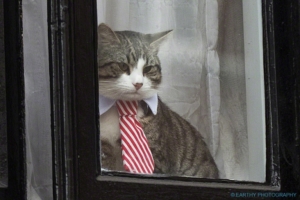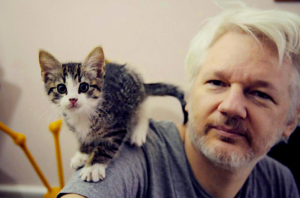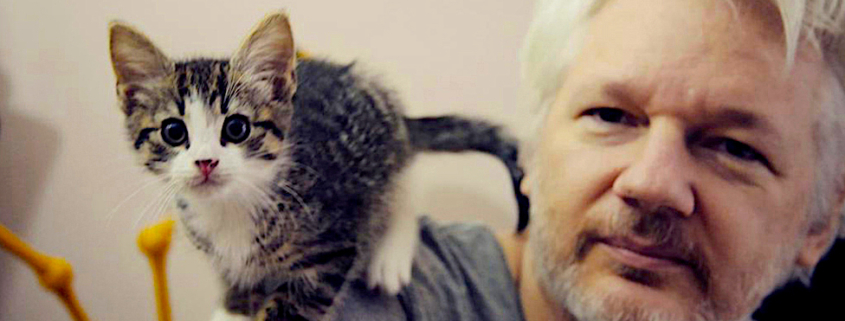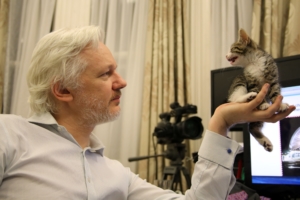Julian Assange, A Cat, and Diplomatic Asylum
The Role of A Furry Feline in an International Arrest
Julian Assange lived as a guest of the Ecuadorian embassy for more than seven years. Running from various charges, including a rape accusation in Sweden and an espionage charge by the United States, the embassy encompassed his last stand at resistance. Admired by some, and reviled by others, he attracted international notoriety and guests from around the world, including Amal Clooney as well as Pamela Anderson. Nevertheless, as time dragged on, and the presidency in Ecuador changed, the Ecuadorian government began to lose their patience with this famous visitor. Why? Well, at least one of the reasons included the fact that he did not properly care for his cat.
Through natural selection, cats have evolved into our nearly perfect companions. Left with the most basic of provisions, they can seemingly be left alone unattended for days. However, having a cat does take some effort, regardless of how self-sufficient they may seem. For instance, kitty litter must be provided and changed, as well as food and water. Without the supply of these essential items, cats will devolve into the angriest of creatures, often using the entire house as their litter box and meowing until, at which time, they feel properly attended.
 In the absence of any specific reports, we are only left to guess how Assange neglected his beloved feline. One can imagine an Ecuadorian ambassador walking through the hallways of the embassy saying, “Is that cat pee I smell? Julian, this cat has destroyed our carpeting! Change its litter box, now!” Furthermore, one can also imagine the feline, pawing and begging at the office doors of the embassy employees, begging for food, because Julian, so caught up in international intrigue and the releasing of classified documents, forgot to feed his baby kitten. Repeated infractions would lead to Julian being branded as, not only a bad kitten father, but also a bad houseguest.
In the absence of any specific reports, we are only left to guess how Assange neglected his beloved feline. One can imagine an Ecuadorian ambassador walking through the hallways of the embassy saying, “Is that cat pee I smell? Julian, this cat has destroyed our carpeting! Change its litter box, now!” Furthermore, one can also imagine the feline, pawing and begging at the office doors of the embassy employees, begging for food, because Julian, so caught up in international intrigue and the releasing of classified documents, forgot to feed his baby kitten. Repeated infractions would lead to Julian being branded as, not only a bad kitten father, but also a bad houseguest.
Now, it is imperative to understand that Assange did not view himself as a houseguest, but instead as an asylum seeker. After all, he was subsequently granted this status under the rules of diplomatic asylum. However, one can fairly say, especially in light of recent circumstances, that the rules of pet caretaking overrule the rules of diplomatic asylum when our feline friends are involved.
 In November 2017, the Ecuadorian released a nine-page document regarding behavior requirements for Julian Assange. The rules included, amongst others, taking care of his cat’s “well-being, food, and hygiene,” or risk losing the rights to having a cat. (1) In response, Assange released pictures of himself and his beloved feline to the media, showing how much they adored one another. Apparently unable to live according to these unbearably harsh guidelines, Assange eventually released the cat to a local shelter, allegedly for the sake of its own well-being. One can just as easily argue that Assange embarked upon this act for his own well-being, considering his hosts had become arguably disgusted and tired of dealing with their long-standing infamous houseguest.
In November 2017, the Ecuadorian released a nine-page document regarding behavior requirements for Julian Assange. The rules included, amongst others, taking care of his cat’s “well-being, food, and hygiene,” or risk losing the rights to having a cat. (1) In response, Assange released pictures of himself and his beloved feline to the media, showing how much they adored one another. Apparently unable to live according to these unbearably harsh guidelines, Assange eventually released the cat to a local shelter, allegedly for the sake of its own well-being. One can just as easily argue that Assange embarked upon this act for his own well-being, considering his hosts had become arguably disgusted and tired of dealing with their long-standing infamous houseguest.
On the morning of April 11, 2019, London police pulled Julian from his Ecuadorian refuge. In response, hundreds of individuals came forward offering to adopt Assange’s cat, apparently unaware it had already been given away. While escaping to the embassy encompassed Assange’s last stand at resistance, the giving away of the beloved feline arguably represented his last stand at attempting to become a good houseguest. But, alas, Assange had acted too late, with the damage already done, leaving his hosts searching for a humane and legal way to get him removed from their premises. Releasing classified documents is forgivable, but apparently, neglecting a cat is not.





Leave a Reply
Want to join the discussion?Feel free to contribute!